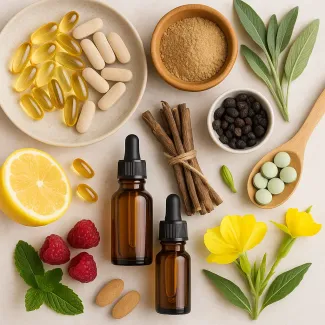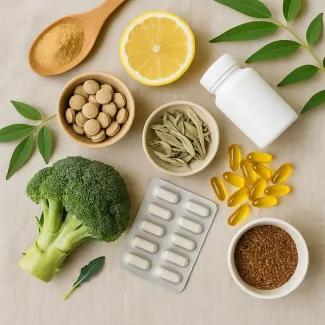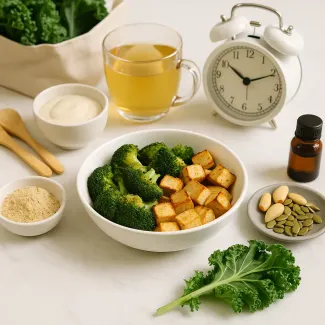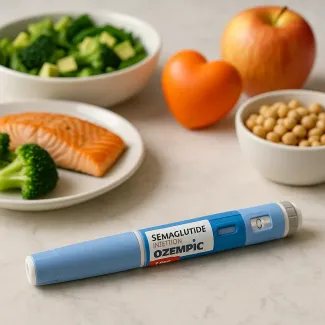
Holistic support for women’s hormonal changes at every stage
Easing PMS and menopause naturally through nutrition, herbs, and lifestyle
Understanding the female hormonal rhythm
The female hormonal cycle is a dynamic process that shifts throughout life—from monthly fluctuations during menstruation to more permanent changes in perimenopause and menopause. For many women, these transitions are accompanied by symptoms such as irritability, fatigue, bloating, hot flashes, insomnia, and mood swings.
Hormonal imbalances can occur when estrogen, progesterone, or other key hormones fluctuate beyond optimal levels. While medical therapies exist, more women are turning to natural remedies to support their body’s internal balance with fewer side effects.
Common symptoms of PMS and menopause
Premenstrual syndrome (PMS)
PMS can appear 1–2 weeks before menstruation and may include:
- Cramps and abdominal discomfort
- Breast tenderness
- Mood swings or increased emotional sensitivity
- Bloating and water retention
- Fatigue and poor concentration
- Cravings, especially for sugar or salt
Menopausal and perimenopausal symptoms
Hormonal decline or fluctuations during perimenopause and menopause may lead to:
- Hot flashes and night sweats
- Insomnia and disrupted sleep
- Vaginal dryness
- Memory issues and brain fog
- Anxiety, low libido, and irritability
- Joint stiffness and decreased bone density
Understanding the root of these symptoms helps in choosing natural solutions tailored to your body’s needs.
Top natural supplements for hormonal support
Magnesium for calm and cramps
Magnesium plays a critical role in muscle function, mood regulation, and hormone production. It can help reduce cramps, migraines, and irritability related to PMS and perimenopause. Magnesium glycinate or citrate are particularly well-absorbed forms.
Vitamin B6 for mood balance
Vitamin B6 supports the production of serotonin and dopamine, improving emotional resilience and energy. It is especially useful in alleviating irritability, low mood, and food cravings during the luteal phase.
Omega-3 fatty acids for inflammation and brain health
EPA and DHA, found in fish oil and algae-based supplements, support hormonal function, reduce inflammation, and help manage anxiety and menstrual pain. They also promote brain clarity in menopausal women.
Vitex agnus-castus (Chaste Tree)
This herb has been traditionally used to ease PMS by gently balancing progesterone and estrogen levels. It may reduce breast tenderness, mood swings, and irregular periods, especially in the second half of the cycle.
Black cohosh for menopausal symptoms
Black cohosh is one of the most researched herbs for menopause, shown to reduce hot flashes, night sweats, and sleep disturbances without impacting estrogen levels directly.
Ashwagandha for stress and hormonal resilience
Ashwagandha is an adaptogenic herb that lowers cortisol, the body’s stress hormone. Chronic stress can aggravate hormonal imbalance, and this root helps restore equilibrium by improving sleep, mood, and fatigue.
Evening primrose oil for breast pain and dryness
Rich in gamma-linolenic acid (GLA), evening primrose oil supports skin hydration, vaginal moisture, and breast comfort. It’s especially helpful for perimenopausal women experiencing dryness and skin changes.
Gut health and its connection to hormones
A healthy gut microbiome regulates estrogen metabolism. Disruptions in gut flora (dysbiosis) can lead to estrogen dominance, exacerbating PMS and menopause symptoms. Supporting gut health through diet and targeted supplements can make a difference.
Probiotics
Lactobacillus and Bifidobacterium strains support hormonal detoxification, reduce bloating, and enhance mood. Regular intake via fermented foods or supplements helps maintain a resilient microbiome.
Fiber
A fiber-rich diet aids in estrogen clearance through the digestive system. Include foods like chia seeds, flaxseeds, berries, leafy greens, and whole grains.
Blood sugar stability and hormone balance
Unstable blood sugar contributes to mood swings, cravings, and fatigue, especially during PMS. Over time, insulin resistance can impair ovarian function and increase inflammation.
Strategies to stabilize blood sugar
- Eat protein-rich meals (e.g., eggs, legumes, tofu)
- Include healthy fats (avocado, olive oil, nuts) in every meal
- Choose low-glycemic carbs like quinoa and sweet potatoes
- Avoid skipping meals or fasting excessively during hormonal fluctuations
Sleep and hormonal recovery
Sleep is critical for hormone regeneration, especially melatonin, growth hormone, and progesterone. Insomnia worsens during perimenopause due to declining progesterone and estrogen.
Natural ways to enhance sleep
- Use magnesium or L-theanine in the evening
- Drink chamomile or passionflower tea
- Keep a cool, dark bedroom and avoid screens before bed
- Maintain a consistent sleep schedule even on weekends
Physical activity tailored to hormonal phases
Exercise supports circulation, detoxification, and mood—but it should adapt to your energy levels across the month or menopause stage.
Recommended activities
- Gentle yoga or pilates for the luteal phase and perimenopause
- Strength training to support bone density and metabolism
- Walking, dancing, or swimming to reduce cortisol and boost endorphins
Over-exercising, especially with high-intensity cardio during PMS or menopause, can increase stress and worsen symptoms.
Anti-inflammatory diet for hormone balance
Chronic inflammation worsens estrogen imbalance, hot flashes, and digestive issues. An anti-inflammatory eating pattern supports hormonal health.
Best anti-inflammatory foods
- Leafy greens (kale, spinach, arugula)
- Berries, pomegranates, and cherries
- Turmeric, ginger, cinnamon
- Cold-water fish (sardines, mackerel, wild salmon)
- Nuts, seeds, and extra virgin olive oil
Avoiding processed sugars, alcohol, refined flour, and seed oils can further reduce hormonal inflammation.
Adaptogens for long-term hormonal support
Adaptogens help your body adapt to stress, promoting endocrine resilience.
Top adaptogens for women
- Rhodiola: Supports mental focus and reduces fatigue
- Maca root: Traditionally used in the Andes to balance hormones and boost libido
- Schisandra: A berry-based adaptogen that supports the liver, critical for hormone clearance
Skin and hair changes during hormonal shifts
Hormonal changes affect collagen, hydration, and sebum production. Supporting skin health naturally can ease the cosmetic impact of menopause.
Skin-supportive nutrients
- Vitamin C: Stimulates collagen production
- Zinc: Helps with acne and scalp health
- Hyaluronic acid: Supports skin hydration
- Collagen peptides: May reduce skin sagging and dryness
Herbal teas and infusions
Herbal teas can offer gentle support throughout the cycle or menopause, soothing the nervous system, reducing cramps, or calming hot flashes.
Recommended herbal infusions
- Raspberry leaf tea: Tones the uterus and eases cramps
- Peppermint tea: Soothes bloating and digestive issues
- Sage tea: Traditionally used to reduce night sweats
- Licorice root: Supports adrenal health but should be used cautiously
Essential oils for symptom relief
Aromatherapy supports mood, sleep, and pain management during hormonal shifts.
Best essential oils for women
- Clary sage: Known to reduce PMS cramps and balance hormones
- Lavender: Promotes relaxation and sleep
- Geranium: Balances mood swings and supports skin
- Peppermint: Relieves headaches and boosts energy
Always dilute essential oils and apply with caution.
Environmental toxins and hormone disruption
Certain chemicals found in plastics, cosmetics, and cleaning agents act as endocrine disruptors, mimicking estrogen and altering natural balance.
How to reduce exposure
- Use glass or stainless steel instead of plastic containers
- Choose natural personal care products free from parabens and phthalates
- Filter drinking water with activated charcoal or reverse osmosis
- Avoid non-stick pans with PFOA/PFAS chemicals
Cycle syncing your lifestyle
Aligning your nutrition, movement, and rest to your menstrual phases may enhance energy, reduce symptoms, and promote mental clarity.
Lifestyle suggestions by phase
- Menstrual (Days 1–5): Rest more, eat warming foods (soups, stews)
- Follicular (Days 6–13): Increase protein and leafy greens, light workouts
- Ovulatory (Days 14–16): Enjoy more raw foods, cardio, and social activity
- Luteal (Days 17–28): Add magnesium-rich foods, limit stimulants, slow down
Liver support and estrogen detox
The liver plays a key role in breaking down hormones. Sluggish liver function can lead to estrogen buildup, making PMS or menopause symptoms worse.
Natural liver support
- Dandelion root and milk thistle
- Beetroot, lemon, and artichokes
- Limit alcohol and excessive sugar intake
Hydration and hormone balance
Proper hydration helps circulation, detoxification, and temperature regulation, especially during hot flashes or bloating episodes.
Tips for better hydration
- Aim for 2–3 liters daily, including herbal teas and infused waters
- Add electrolytes during intense sweating or hot weather
- Avoid excessive caffeine, which can be dehydrating and affect sleep
Emotional resilience and mindfulness
Hormonal changes often amplify emotional responses. Cultivating mental resilience through lifestyle practices can reduce anxiety and enhance self-awareness.
Mind-body techniques
- Meditation and breathwork
- Journaling for emotional clarity
- Time in nature for grounding and hormone-regulating light exposure
- Creative outlets like painting or music therapy
Personalized tracking and awareness
Every woman’s body is unique. Tracking your symptoms, cycle, and triggers can help identify patterns and tailor natural strategies more effectively.
Recommended tools
- Cycle tracking apps (e.g., Flo, Clue, MySysters)
- Symptom diaries to monitor mood, sleep, and digestion
- Functional lab testing (hormone panels, cortisol, nutrient levels)
Understanding your personal rhythm empowers you to make informed health choices.





